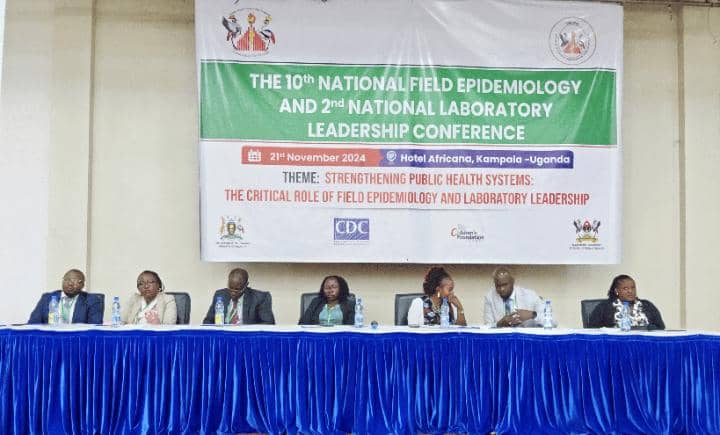By Julius Mugaga Tukacungurwa/Umoja Standard.
Kampala, Uganda: The 10th National Field Epidemiology and 2nd National Laboratory Leadership Conference convened on November 21st, 2024, at Hotel Africana in Kampala, Uganda showcased the expertise of Field Epidemiology and Laboratory Leadership Training Program Fellows, who presented over 40 reports highlighting key findings on pressing public health concerns, including infectious diseases, laboratory systems, and surveillance. The conference fostered a collaborative platform for national and international experts to address community health issues.
While giving his opening remarks, Professor Elizeus Rutebemberwa, Deputy Dean of Makerere University School of Public Health said; “Today, we celebrate the achievements of our fellows who have applied their knowledge and skills to address public health challenges,”
He emphasized the importance of evidence-based decision-making, stating that the research findings presented at the conference would inform policy and practice in Uganda’s health sector.
The host of the conference, Dr. Issa Makumbi, the Deputy Director of the Uganda National Institute of Public Health (UNIPH), expressed gratitude to the faculty members for producing exceptional fellows who will take up leadership roles in public health.
He emphasized that the Institute is science-based, drafting policies and strategies rooted in evidence. Makumbi praised the fellowship program, noting its competitive nature and focus on learning through service.
He encouraged others to join the program, highlighting its growth and ability to meet the country’s needs. Makumbi also thanked the Ministry, Government, academia, and partners for their support, emphasizing the importance of collective effort in advancing public health.
Dr. Mary Boyd, the Center for Disease Control and Prevention (CDC) Uganda Country Director, commended Uganda’s Public Health Fellowship for its outstanding contributions to saving lives in Uganda. “This fellowship is a shining example of the long-standing collaboration between the U.S. government, Makerere University, and the Ministry of Health.”
Dr. Boyd emphasized that achieving global health security requires working together, citing the United States Global Health Security Strategy of 2024. She highlighted the importance of integration and resilience in addressing health challenges, praising Uganda’s efforts in responding to disease outbreaks like COVID-19, Ebola, and Mpox.
Dr. Solome Okware, representing the Acting Country Representative of the World Health Organization (WHO) in Uganda, commended the Government of Uganda for its commitment to health security. At the Conference, Okware emphasized the critical role of collective action in addressing public health challenges.
“The country relies on this team to safeguard populations by detecting, investigating, and responding to outbreaks at the source,” Okware said.
The WHO encourages all member states to embed field epidemiology training programs into national health systems and absorb trained personnel within the health work
In attendance also was Dr. Dithan Kiragga, Executive Director of Baylor Foundation Uganda who commended the collaborative efforts behind the Field Epidemiology Training Program and the Laboratory Leadership Program. “We note that there is an urgent need for such programs in the country to train poultry professionals in collaboration, communication, coordination, and mentorship skills,” Dr. Kiragga said.
The graduates of the Laboratory Leadership Program play a critical role in strengthening Uganda’s national laboratory system, enhancing the country’s capacity to respond to human, animal, and environmental health challenges.
Dr. Kiragga congratulated the Ministry of Health for creating opportunities for leadership development and expressed appreciation for the partnership with the National Institutes of Public Health.
The 10th National Field Epidemiology and 2nd National Laboratory Leadership Conference successfully brought together national and international experts to address pressing public health concerns in Uganda. With over 40 reports presented, the conference showcased the expertise of Field Epidemiology and Laboratory Leadership Training Program Fellows. The event emphasized the importance of evidence-based decision-making, collective action, and integration in addressing public health challenges, paving the way for a stronger, more resilient health system in Uganda.


